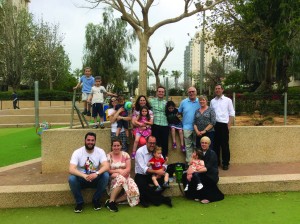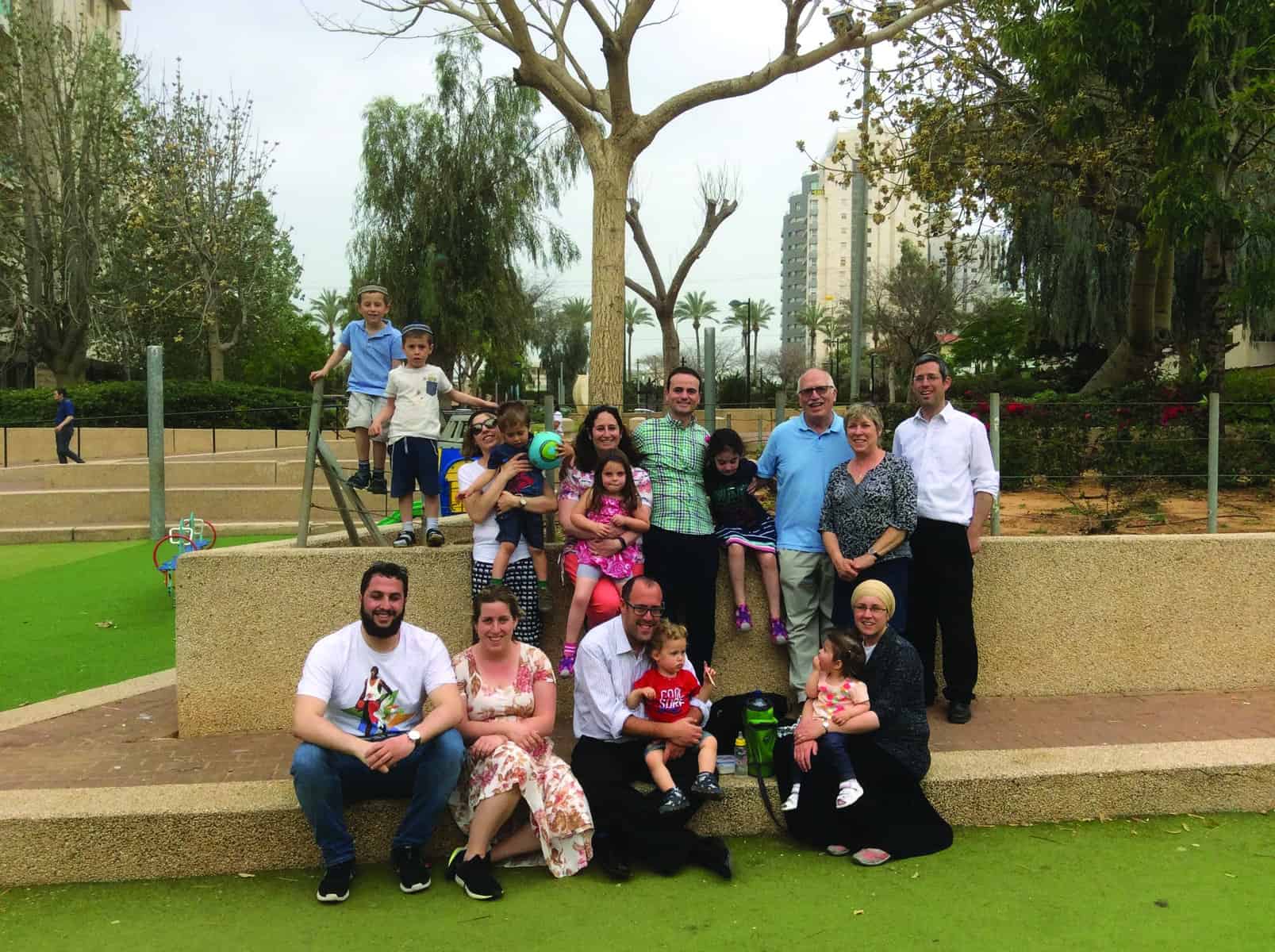 Several Tidewater Jewish community members have friends and relatives who live in Israel and were candid in talking about the current situation. When asked how their lives have been affected and how they feel about the ongoing con-flict, this is what they said:
Several Tidewater Jewish community members have friends and relatives who live in Israel and were candid in talking about the current situation. When asked how their lives have been affected and how they feel about the ongoing con-flict, this is what they said:
ARLENE STRELITZ
The former Norfolk resident and John Strelitz’s mother built a home in Israel in 1979. She first visited in 1961.
I have been in Israel the last few weeks and am still here. The war was terrible and a waste of human lives on both sides. The problem is difficult and will take excellent leadership and extreme good will to ever be resolved. Fighting will not do it.
I am appalled how antisemitism has reared its ugly head. I believe that this is not the time for Jews to lay low and hope for the best. Rather, we must stand tall and let it be known that we will not accept such behavior. We cannot remain silent.
ELISHEVA GLIKMAN
Virginia Beach resident Chen Glikman’s mother moved from the south to Givat Olga, a neighborhood next to Hadera last summer. Their friends and family members still live in the South.
The past weeks were stressful and frightening even though this time we were not in the missile range. We thought about all our friends and family who had to run to the shelters and fear for their lives. lt woke up our own experiences with those situations.
The most frightening were the inner conflicts between extremists of both sides in our country.
We think that the solution is a Palestinian country. We don’t want any responsibility over them. Let them have their country. And then let them try to take our own. I’m sure they will regret it. This solution should have happened a long time ago.
Still, we live in a democracy and our chosen leaders have failed to find a non-violent solution to the problem. We still hope for a better future and think this place is the best for our people.
ORTAL LEDER
A friend of Carly Glikman, she lives in Shoval, a kibbutz between Gaza and Beersheva.
We are running to the shelter twice a day. After three COVID quarantines for two months each, and now this, 14 days at home, we just want a normallife with our children back at school!
BARBARA WESTBROOK Erinn Foleck Portnoy’s aunt.
We are a retired couple living in the coastal city of Netanya about 20 miles north of Tel Aviv. But remember, this is a small country.
On a personal and physical level we were not impacted greatly by the recent bombardment from Gaza. We had two sirens on one evening and had to stay in our safe room for about 10 minutes each time. This is in our apartment so was not a great physical inconvenience. This and other measures like the development of the Iron Dome show positive steps that Israel has taken to protect its citizens.
Our daughter who lives nearer to Tel Aviv had to take her three sleeping children down three flights of stairs into their safe room. Schools in certain areas were closed which caused childcare problems or working parents.
We curtailed many of our usual activities and did not travel to Jerusalem to visit our other grandchildren as non-essential travel was discouraged.
On a more psychological level, the violence between some Jews and some Israeli Arabs in mixed cities was much more upsetting.
This sort of violence had not been seen on Israeli streets for many years. There are a number of such cities where different religions have tolerated each other and lived together for decades. In Netanya, we have many Israeli Arab workers—doctors, pharmacists, teachers, nurses, and often Arab families take advantage of our beautiful beaches with-out incident. Hopefully, this peace will return soon.
As English expats we were very disturbed by the blatant anti-Semitism on the streets of London and on social media. I feel that many of these so-called “celebs” or “influencers” are totally uninformed about the situation in the region but jump on the anti-Israel bandwagon at any opportunity.
LIZ DOVRAT
Barbara Dudley’s daughter, Liz lives with her family on Kibbutz Yiftah in the north.
I’m happy to share my perspective on the current situation. In a single word—it’s complicated. I’m angry that politicians on both sides have taken advantage of the situation to improve their political standing (Hamas demonstrating its strength, power, and influence beyond Gaza and Benjamin Netanyahu and other Jewish right-wing leaders using the conflict to save their political careers) at a high cost to the Israeli and Gaza citizenry.
I’m thoroughly disturbed by the blatant anti-Arab and anti-Jew hatred seen on the streets of Israel, through violent pro-tests in Israeli cities—making the divides in the society deeper and even more difficult to bridge. Arabs in Israel, even as citizens with equal rights, do face discrimination at all levels of society—poorer education, fewer job opportunities, and racial profiling. They have legitimate reasons to be angry, frustrated, and furious. However, Arab leadership, both in and outside of Israel, still refused to accept the existence of Israel and the rights of Jews to live in Israel, breeding hatred towards Jews from an early age.
While I hate that women and children in Gaza are suffering from the deterioration of living standards that were already extremely low, I support Israel in defining herself. Israel has spent the time and money in creating an effective civil defense infrastructure to protect citizens from rockets. There is a system of sirens across the country warning about incoming rockets. Every Israeli citizen has access to a bomb shelter, most houses built in the last two decades have to have a bomb shelter as a room made with dou-ble-enforced concrete (I’m sitting in our bomb shelter, it is our office). The Israeli army developed the Iron Dome, which can intercept incoming rockets with breathtaking accuracy. The army also uses a combination of drones and high-tech missiles to pinpoint the exact locations of terrorist targets, in an effort to minimize civilian casualties in Gaza. Hamas, on the other hand, locates rocket launchers near or in houses, schools, and hospitals. Civilians are used as shields. Also, Hamas has invested money and materials into building an arsenal of rockets and an elaborate set of underground tunnels instead of using the money to build infra-structure, housing, and generally raise the standard of living for the citizens.
I see the ceasefire as necessary to return to at least a sense of normalcy and to stop the destruction in Gaza. Unfortunately, I don’t think any of the basic problems have been solved. It is just a question of how long the next round has been delayed. I don’t see Hamas making any fundamental changes in their approach to Israel or accepting Israel’s right to exist, especially since they are declaring victory among the ruins of Gaza. In Israel, the right has been strengthened by this round, which will lead to more discrimination and mistrust of Arabs.
I wish I could end on a more hopeful note. I’m pessimistic about any real chance of peace happening soon, but I do see glimmers of hope in places where Jews and Arabs work together, like in hospitals and higher education.
My personal life was not directly affected since I live in the north away from the fighting. The only major effect was that I had to cancel a vacation to Caesarea with my family because of the fighting and the difficulty of describing the situation to my five-year-old twins. They understood there was a war, it caused our vacation to be canceled, and that people were hurt. It was heartbreak-ing not having a good answer to their question, “If we stop fighting, they’ll have to stop shooting rockets at us, right?”

